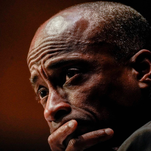Philip Jefferson, an economist who joined the Federal Reserve’s Board of Governors in May 2022, was by President Biden on Friday to be its vice chair. I didn’t write about his appointment last year; his proposed elevation gives me a second chance to discuss his ideas. There’s more to chew on now: The Fed website has he’s given since joining the board on such topics as inflation, inclusive economic growth and technology’s impact on the postpandemic economy.
Jefferson grew up in the Kingman Park neighborhood of Washington, D. C. , where “the line between a future of success or struggle was thin,” he at his confirmation hearing.
He became a Fed staff economist, a professor and then the vice president for academic affairs and dean of faculty at in North Carolina. On the Board of Governors he is considered a centrist. “He has built a reputation as an inquisitive listener with an interest in staff economic research,” my news colleague Jeanna Smialek on Friday.
(Biden also nominated Adriana Kugler to the Board of Governors. A Colombian American economist who is on leave from Georgetown University to serve as the U. S.
-appointed of the World Bank, she would be the first Hispanic person on the Fed board. ) If confirmed as vice chair, as is expected, Jefferson would become the second Black person to serve in the post, following Roger W. Ferguson Jr.
, who from 1999 to 2006. Jefferson is the kind of guy who invites his to his swearing-in. “I’ve known Philip Jefferson since I tried to hire him out of graduate school,” Stephen Cecchetti, a professor of international finance at Brandeis International Business School, wrote me in an email.
“I was thrilled when he agreed to join the board and couldn’t be happier with this nomination. He will do an excellent job. ” Before his nomination, the conservative Hoover Institution invited Jefferson to speak at a last Friday, How to Get Back on Track, which followed a 2022 conference, How Monetary Policy Got Behind the Curve.
In his , Jefferson stood up for the central bank. He challenged Hoover’s presumption that the Fed’s monetary policy did get behind the curve or needed to get back on track. Jefferson told the Hoover audience: “Policymakers should continuously update their priors about how the economy works as new data become available.
In other words, it is appropriate to change one’s perspective as new facts emerge. In this sense, I am in favor of a Bayesian approach to information processing. ” Jefferson also pushed back against critics of Fed policy in a speech in February at the , an annual event that brings Fed governors and Fed regional bank presidents together with Wall Street and academic economists.
Jefferson was responding to a called “Managing Disinflations. ” Disinflating is the tricky procedure the Fed is preoccupied with right now. The report’s authors warned that “there is no post-1950 precedent for a sizable central-bank-induced disinflation that does not entail substantial economic sacrifice or recession.
” Pessimistically, they also projected that “the Fed will need to tighten policy significantly further to achieve its inflation objective by the end of 2025. ” (The Fed has raised its key rate half a percentage point since the report’s release. ) In his , Jefferson said that the Covid shock was so deep and unusual that the standard rules of economic modelers don’t fully apply.
“History is useful, but it can only tell us so much, particularly in situations without historical precedent,” he said. The authors of the report Jefferson was responding to, including Cecchetti, had written that the Fed “weakened its credibility for controlling inflation” when it changed its policy strategy in 2020. Jefferson responded that the Fed is more credible now than it was in the 1960s and 1970s, when inflation got out of control.
Jefferson concluded: “Economic models are important tools but need to be used with careful interpretation and judgment when history does not speak to the current situation. ” He said models need to be “complemented with additional analytical tools, including careful scrutiny of real-time data. ” Kim Schoenholtz, another of the authors of the report that Jefferson responded to, told me on Monday that he still thinks the Fed’s strategy change in 2020 weakened its inflation-fighting credibility.
But Schoenholtz, a clinical professor emeritus at New York University’s Stern School of Business, said, “There’s plenty of room for thoughtful people to disagree. His presentation was a thoughtful one. ” In a nutshell, Jefferson has positioned himself roughly at the center of Fed rate setters and shown that he’s prepared to make a strong case for the bank’s policies.
That may help explain why he’s in position to become the Fed’s vice chair. Federal debt held by the public is on track to grow to 119 percent of gross domestic product by 2033, which would be “the highest level ever recorded in the United States and would be on track to rise even further,” the nonpartisan Congressional Budget Office on Friday. It said the projection is made “without regard to the statutory limit on the issuance of new federal debt.
” The numbers are close to the C. B. O.
’s forecast in February. They incorporate some technical updates but use the same economic forecast. “Monsters cannot be announced.
One cannot say: ‘Here are our monsters,’ without immediately turning the monsters into pets. ” — Jacques Derrida, “Some Statements and Truisms About Neologisms, Newisms, Postisms, Parasitisms, and Other Small Seismisms,” in “The States of ‘Theory,’” edited by David Carroll (1990).
From: nytimes
URL: https://www.nytimes.com/2023/05/15/opinion/fed-vice-chair-philip-jefferson-inflation.html



